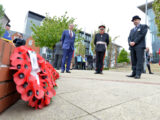
How to get the most from your GP
The NHS is encouraging all GPs to become Veteran friendly accredited.
Currently over 1000 GP surgeries in England have staff trained to be aware of health problems that veterans might face.
These are referred to as veteran friendly. They are designed to support you with your healthcare in many ways, including:
- having health staff with military healthcare backgrounds
- having staff trained to treat health problems that commonly affect veterans
- having knowledge of specialist NHS and DMS services designed specifically for members of the armed forces

You can contact a GP surgery to ask if they are veteran friendly.
Top tips for veterans, to get the most from your GP
1 It is important to register with a GP, rather than wait until you need treatment.
2 If you’ve recently left the forces, it is important to give your GP the paperwork that your military medical centre gave you, including any medical records. This will help to make sure your military health record transfers to your NHS health record. This will also give your GP information on your health and ensure that any ongoing care and treatment is continued.
3 Regardless of when you left the military, tell your GP that you’ve served in the UK Armed Forces. This will help your GP to better understand any military related health conditions that you may have and ensure that you are referred, where appropriate, to dedicated services for veterans.
This includes the specialist mental and physical health services, Op COURAGE: The Veterans Mental Health and Wellbeing Service and the Veterans Trauma Network.
When using these services, you will be able to speak to people who:
- understand the Armed Forces and military life
- are either from the Armed Forces community or highly experienced in working with Serving personnel, reservists, veterans and their families
- will work with you to make sure you get the right type of specialist care, support, and treatment
- work closely with a range of organisations and charities, including military charities, to support your wider health and wellbeing needs.

4 With your agreement, it can sometimes be helpful for your doctor to refer you to Armed Forces charities, such as SSAFA, the Royal British Legion, Combat Stress or Help for Heroes. They can often offer significant help and support, even if they do not all deliver healthcare.
5 You may be worried about sharing information about your time in the Armed Forces. Please note that the NHS is bound by a confidentiality code of practice to ensure GPs, nurses and other people working within the NHS deliver a confidential service bound by law.
For more information, speak to your GP or visit the NHS website at www.nhs.uk/armedforceshealth
Accessing healthcare for Armed Forces families
The NHS provides most health care services for Armed Forces families. Visit the new NHS Armed Forces families web pages at www.nhs.uk/armedforcesfamilies
Follow us on Twitter: @NHSArmedForces



